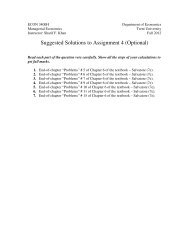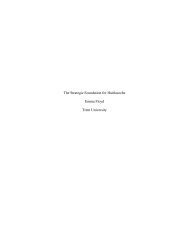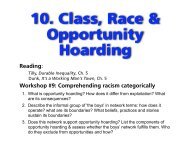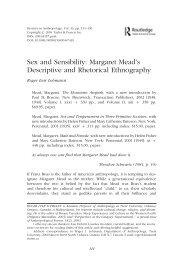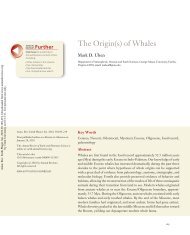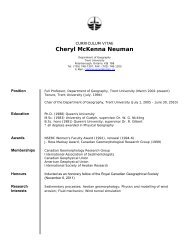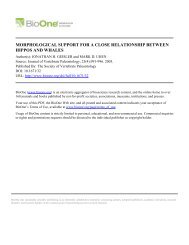REO FORTUNE'S PSYCHOLOGICAL THEORY OF CULTURAL ...
REO FORTUNE'S PSYCHOLOGICAL THEORY OF CULTURAL ...
REO FORTUNE'S PSYCHOLOGICAL THEORY OF CULTURAL ...
Create successful ePaper yourself
Turn your PDF publications into a flip-book with our unique Google optimized e-Paper software.
288 Pacifi c Studies, Vol. 32, Nos. 2/3—June/Sept. 2009<br />
In truth, the Dobuan does not push hard upon logic in his<br />
account of Creation. He does not notice that one legend conflicts<br />
with another. (Fortune [1932a] 1963: 94–95)<br />
Fortune ([1932a] 1963, 126) similarly noted that Dobuans made alternating<br />
use of incompatible explanations for the efficacy of magic without<br />
concern.<br />
In Sorcerers of Dobu, Fortune depicted incompatible beliefs and marveled<br />
at native acceptance of these as unproblematic, but did not explore<br />
the question of how they accomplished this. He did not explore intrapersonal<br />
ambivalence over holding contradictory beliefs, which is a<br />
centerpiece of The Mind in Sleep. It may be that he did not see his job as<br />
an ethnographer of a primitive people to go into these sorts of questions.<br />
Furthermore, doing research into dream symbolism and personal ambivalences<br />
in these exotic field settings would have required rich knowledge of<br />
each informant’s personal quirks, life history, and both idiosyncratic and<br />
symbolic associations circulating in the local culture. As Waud Kracke<br />
(1987, 1999) has observed in his psychoanalytic studies of dreaming in<br />
Amazonia, an intimacy is required between ethnographer and informants<br />
that may not have been easily possible, given constraints of time, linguistic<br />
competence, and the other ethnographic work that Fortune faced (see also<br />
Spiro 2003).<br />
Fortune’s book on Native North America, Omaha Secret Societies<br />
([1932b] 1969), is a rich and sophisticated account of both thriving and<br />
faded religious practices and beliefs in a tribe facing poverty and acculturation.<br />
Fortune ([1932b] 1969, 5) gave the role of dreaming in social life<br />
some attention, noting first that dream visions are not linguistically distinguished<br />
from waking ones. His ethnographic attention to dream narratives<br />
here secured him a recognized place in the ethnology of dreaming (Lohmann<br />
2007).<br />
Fortune quoted Small Fangs, who told of having been drawn to a place<br />
by a sweet smell (indicating a supernatural presence). Here, he saw one<br />
snake writhing over another snake he had dismembered shortly before,<br />
“doctoring the cut snake” (Fortune [1932b] 1969, 56). Small Fangs took<br />
this as a vision conferring healing ability, and accordingly, when his wife<br />
Lea was ill twenty years later:<br />
I told Lea about the snakes and told her to dream about it. She<br />
did dream that those snakes came to her and said to her to eat<br />
peyote and she would get well. So when she came home they had<br />
a peyote meeting and gave her peyote tea and she felt happier.<br />
(Fortune [1932b] 1969, 57)<br />
pacs-32-02-06.indd 288 9/7/2009 2:32:34 PM



